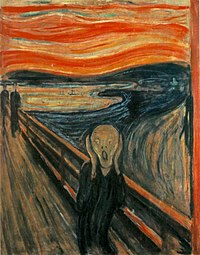
Social Anxiety Disorder as a Densely Interconnected Network of Fear and Avoidance for Social Situations
Sign Up to like & getrecommendations! Published in 2017 at "Cognitive Therapy and Research"
DOI: 10.1007/s10608-017-9876-3
Abstract: The hallmark symptoms of social anxiety disorder (SAD) are fear and avoidance of social evaluative situations. Yet, even people without SAD sometimes fear and avoid certain social situations without ever developing the disorder. Apart from… read more here.
Keywords: fear avoidance; avoidance social; network; social situations ... See more keywords

Fear, Avoidance, and Disability in Headache Disorders
Sign Up to like & getrecommendations! Published in 2020 at "Current Pain and Headache Reports"
DOI: 10.1007/s11916-020-00865-9
Abstract: Purpose of Review The purpose of this review is to summarize the role of avoidance behavior in headache-related disability and overview relevant clinical implications. Recent Findings Avoidance occupies a central role in contemporary psychological perspectives… read more here.
Keywords: disability; avoidance behavior; avoidance; fear avoidance ... See more keywords

Effects of Exercise Training on Fear-Avoidance in Pain and Pain-Free Populations: Systematic Review and Meta-analysis
Sign Up to like & getrecommendations! Published in 2020 at "Sports Medicine"
DOI: 10.1007/s40279-020-01345-1
Abstract: Fear of pain and movement is an important factor in the development of hypervigilance and avoidance behaviours. We examined the effectiveness of exercise training on improving fear-avoidance beliefs. A systematic review (data sources: MEDLINE, CINAHL,… read more here.
Keywords: fear avoidance; exercise training; reducing fear; avoidance ... See more keywords

Evaluation of Cognitive Behavioral Interventions and Psychoeducation Implemented by Rehabilitation Specialists to Treat Fear-Avoidance Beliefs in Patients With Low Back Pain: A Systematic Review.
Sign Up to like & getrecommendations! Published in 2018 at "Archives of physical medicine and rehabilitation"
DOI: 10.1016/j.apmr.2017.11.003
Abstract: OBJECTIVES To systematically locate, critically appraise, and synthesize the available evidence regarding the effectiveness of cognitive behavioral therapies (CBTs) and psychoeducation that can be implemented by rehabilitation specialists to treat fear-avoidance beliefs in patients with… read more here.
Keywords: fear avoidance; rehabilitation specialists; avoidance beliefs; psychoeducation ... See more keywords

Training and testing for a transformation of fear and avoidance functions via combinatorial entailment using the Implicit Relational Assessment Procedure (IRAP): Further exploratory analyses
Sign Up to like & getrecommendations! Published in 2020 at "Behavioural Processes"
DOI: 10.1016/j.beproc.2019.104027
Abstract: Experiment 1 of the current research attempted to establish fear and avoidance functions for arbitrary stimuli via combinatorial entailment using training and testing versions of the Implicit Relational Assessment Procedure (IRAP). The critical tests for… read more here.
Keywords: via combinatorial; fear; transformation; avoidance functions ... See more keywords

Heightened generalized conditioned fear and avoidance in women and underlying psychological processes.
Sign Up to like & getrecommendations! Published in 2022 at "Behaviour research and therapy"
DOI: 10.1016/j.brat.2022.104051
Abstract: Heightened generalization of conditioned fear and avoidance to safe stimuli resembling threat is a key feature of pathological anxiety and might contribute to the increased prevalence of anxiety-related disorders among women. Though animal studies have… read more here.
Keywords: avoidance women; fear avoidance; generalized avoidance; conditioned fear ... See more keywords

Understanding the aetiology of fear of falling from the perspective of a fear-avoidance model - A narrative review.
Sign Up to like & getrecommendations! Published in 2020 at "Clinical psychology review"
DOI: 10.1016/j.cpr.2020.101862
Abstract: Approximately half of older adults experience fear of falling (FoF) but the aetiology is unclear. The aim is to review the literature on physiological, mood and cognitive factors associated with FoF and to interpret these… read more here.
Keywords: fear; model; avoidance model; review ... See more keywords

Exploratory factor analysis of the fear-avoidance beliefs questionnaire in patients with chronic ankle instability.
Sign Up to like & getrecommendations! Published in 2021 at "Foot"
DOI: 10.1016/j.foot.2021.101902
Abstract: PURPOSE To perform an exploratory factor analysis of the Fear-Avoidance Beliefs Questionnaire in patients with chronic ankle instability. METHODS A cross-sectional survey study was utilized. The Fear-Avoidance Beliefs Questionnaire was administered to patients with chronic… read more here.
Keywords: avoidance beliefs; fear avoidance; factor analysis; beliefs questionnaire ... See more keywords

The relationship between chronic musculoskeletal pain, anxiety and mindfulness: Adjustments to the Fear-Avoidance Model of Chronic Pain
Sign Up to like & getrecommendations! Published in 2017 at "Scandinavian Journal of Pain"
DOI: 10.1016/j.sjpain.2017.08.006
Abstract: Abstract Background and purpose The Fear-Avoidance Model of Chronic Pain proposed by Vlaeyen and Linton states individuals enter a cycle of chronic pain due to predisposing psychological factors, such as negative affectivity, negative appraisal or… read more here.
Keywords: mindfulness; ruminative anxiety; fear avoidance; chronic pain ... See more keywords

Cogniphobia and neuropsychological functioning in migraine.
Sign Up to like & getrecommendations! Published in 2022 at "Neuropsychology"
DOI: 10.1037/neu0000808
Abstract: OBJECTIVE Cogniphobia refers to the fear and avoidance of cognitive exertion, believed to cause or exacerbate headache. The objective of the present study was to demonstrate associations between cogniphobia and key fear-avoidance constructs. METHOD In… read more here.
Keywords: fear avoidance; self reported; neuropsychological functioning; headache ... See more keywords

Psychological flexibility moderates the influence of fear avoidance on outcomes after mild traumatic brain injury
Sign Up to like & getrecommendations! Published in 2022 at "Brain Injury"
DOI: 10.1080/02699052.2022.2109747
Abstract: ABSTRACT Objectives Psychological factors contribute to poorer long-term outcomes following mild traumatic brain injury (mTBI); however, the exact psychological mechanisms that underly this relationship are not well understood. This study examined the relationship between psychological… read more here.
Keywords: fear avoidance; brain injury; avoidance; psychological flexibility ... See more keywords